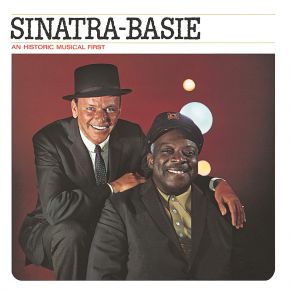Sinatra-Basie: An Historic Musical First
Download links and information about Sinatra-Basie: An Historic Musical First by Count Basie, Frank Sinatra. This album was released in 1962 and it belongs to Jazz, Vocal Jazz, Rock, Punk Rock, Pop, Theatre/Soundtrack, Classical, Easy Listening genres. It contains 10 tracks with total duration of 32:58 minutes.

|
|
|---|---|
| Artist: | Count Basie, Frank Sinatra |
| Release date: | 1962 |
| Genre: | Jazz, Vocal Jazz, Rock, Punk Rock, Pop, Theatre/Soundtrack, Classical, Easy Listening |
| Tracks: | 10 |
| Duration: | 32:58 |
| Buy it NOW at: | |
| Buy on iTunes $4.99 | |
| Buy on Amazon $4.99 | |
| Buy on Songswave €0.93 | |
| Buy on iTunes $6.99 | |
Tracks
[Edit]| No. | Title | Length |
|---|---|---|
| 1. | Pennies from Heaven | 3:28 |
| 2. | Please Be Kind | 2:41 |
| 3. | (Love Is) The Tender Trap | 2:34 |
| 4. | Looking At the World Through Rose Colored Glasses | 2:29 |
| 5. | My Kind of Girl | 4:35 |
| 6. | I Only Have Eyes for You | 3:28 |
| 7. | Nice Work If You Can Get It | 2:35 |
| 8. | Learnin' the Blues | 4:25 |
| 9. | I'm Gonna Sit Right Down (And Write Myself a Letter) | 2:34 |
| 10. | I Won't Dance | 4:09 |
Details
[Edit]The long-awaited first collaboration between two icons, Count Basie and Frank Sinatra, did something unique for the reputations of both. For Basie, the Sinatra connection inaugurated a period in the '60s where his band was more popular and better-known than it ever was, even in the big-band era. For Sinatra, Basie meant liberation, producing perhaps the loosest, rhythmically free singing of his career. Propelled by the irresistible drums of Sonny Payne, Sinatra careens up to and around the tunes, reacting jauntily to the beat and encouraging Payne to swing even harder, which was exactly the way to interact with the Basie rhythm machine — using his exquisite timing flawlessly. Also the members of the Basie band play a more prominent role than usual on a Sinatra record, with soloists like Frank Wess — in some of the finest flute work of his life — and tenors Frank Foster and Eric Dixon getting prominent solo opportunities on several of the tracks. The record was criticized by some as a letdown when it came out, probably because Neal Hefti's charts rarely permit the band to roar, concentrating on use of subtlety and space. Yet the record's restraint has worn very well over the long haul — it doesn't beat you into submission — and it concludes with its best shot, a wonderfully playful treatment of "I Won't Dance." ~ Richard S. Ginell, Rovi